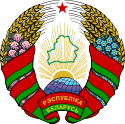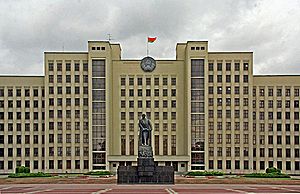- House of Representatives of Belarus
-
Belarus 
This article is part of the series:
Politics and government of
Belarus- Constitution
- President
- Government
- Prime Minister
- National Assembly
- Council of the Republic
- House of Representatives
- All Belarusian People's Assembly
- Judiciary
- Elections
- Foreign relations
- Administrative divisions
- Political parties
Other countries · Atlas
Politics portal
It consists of 110 deputies elected on the basis of universal, equal, free, and direct electoral suffrage by secret ballot (art. 91). It is a majoritarian system, with the outcome decided by overall majorities in single-member constituencies. Any citizen of 21 years is eligible for election (art. 92). The functions of the House are to consider draft laws and the other business of government; it must approve the nomination of a prime minister (art. 97); and it may deliver a vote of no confidence on the government (art. 97).
The upper house is the Council of the Republic.
Contents
Powers
Bills adopted by the House of Representatives are being sent to the Council of the Republic for consideration within five days, where they are considered within no more than twenty days.
Special powers that accorded only to the House of Representatives are:
- consider draft laws put forward by the President or submitted by no less than 150 thousand citizens of the Republic of Belarus, who are eligible to vote, to make amendments and alterations in the Constitution and give its interpretation
- consider draft laws, including the guidelines of the domestic and foreign policy of the Republic of Belarus; the military doctrine; ratification and denunciation of international treaties;
- call elections for the Presidency;
- grant consent to the President concerning the appointment of the Prime minister;
- consider the report of the Prime minister on the policy of the Government and approve or reject it; a second rejection by the House of the policy of the Government is an expression of non-confidence to the Government;
Election rules
Simple majority vote. In the first round, voting is considered valid if over 50 percent of eligible voters take part in the polls. Candidates who receive over 50 per cent of votes are declared elected. If none of the candidates obtains 50 percent of votes, a run-off election between the two leading candidates is held within two weeks. Run-off elections are considered valid if more than 25 percent of eligible voters take part. The candidate securing a simple majority of votes wins the seat. If the second round of voting is held for only one candidate, the candidate needs to obtain the support of over half of the voters taking part in the election.[1]
Candidacy requirements
Candidatures may be submitted by registered political parties, labour collectives or by individuals or groups that collect 1,000 signatures of voters residing in the constituency concerned. Any organization located in the constituency with a staff of at least 300 employees may also submit a candidature.[1]
Speakers of the House of Representatives
Name Entered Office Left Office Anatoly Malofeyev December 28, 1996 November 21, 2000 Vadim Popov November 21, 2000 November 16, 2004 Vladimir Konoplev November 16, 2004 October 2, 2007 Vadim Popov October 2, 2007 October 27, 2008 Vladimir Andreichenko October 27, 2008 Present Fraction
(2008 4 th convocation).
Fraction Number of Deputies  Block Alexander Lukashenko
Block Alexander Lukashenko102  Communist Party of Belarus
Communist Party of Belarus8 References
External links
Presidential elections Parliamentary elections Referendums Categories:- Government of Belarus
- Belarusian parliaments
- National lower houses
- Belarus stubs
Wikimedia Foundation. 2010.
Look at other dictionaries:
House of Representatives — Part of the Politics series Politics List of political topics Politics by country … Wikipedia
House of Representatives of Cyprus — Greek: Βουλή των Αντιπροσώπων Turkish: Temsilciler Meclisi Greek: Vouli ton Antiprosópon … Wikipedia
Belarus — This article is about the country. For other uses, see Belarus (disambiguation) … Wikipedia
Belarus — /byel euh roohs , bel /, n. official name of Byelorussia. * * * Belarus Introduction Belarus Background: After seven decades as a constituent republic of the USSR, Belarus attained its independence in 1991. It has retained closer political and… … Universalium
Belarus Democracy Act of 2004 — The Belarus Democracy Act of 2004 is a United States federal law that authorizes assistance for political parties, non governmental organizations, and independent media working for democracy and human rights in Belarus. The act was signed by… … Wikipedia
Outline of Belarus — T … Wikipedia
National Assembly of Belarus — Belarus This article is part of the series: Politics and government of Belarus Constitution President … Wikipedia
Elections in Belarus — Belarus elects on national level a head of state the president and a legislature. The president is elected for a five year term by the people. The National Assembly ( Nacionalnoje Sabranie ) has two chambers. The House of Representatives ( Palata … Wikipedia
House of Lords — This article is about the British House of Lords. For other uses, see House of Lords (disambiguation). The Right Honourable the Lords Spiritual and Temporal of the United Kingdom of Great Britain and Northern Ireland in Parliament assembled … Wikipedia
Regions of Belarus — Belarus This article is part of the series: Politics and government of Belarus Constitution President … Wikipedia

